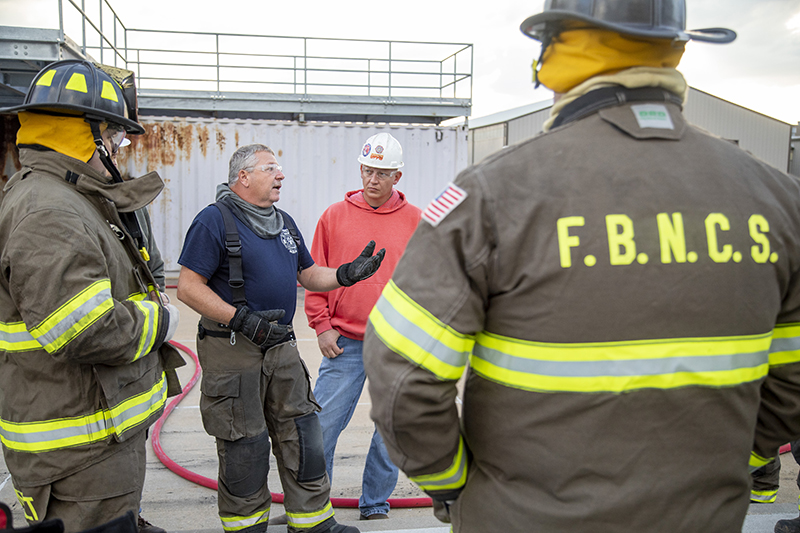Teaching the next generation of power plant specialists

There comes a time in nearly every training session when Chris Romaire feels a hint of nerves.
The 31-year OPPD veteran has seen just about everything that the utility’s Nebraska City Station can throw at him, and he knows how to handle it.
But now that he’s training others to run the plant and generate electricity for thousands of customers, Romaire has a new mission: help others pass the tests they need to fill high-stakes, technical jobs.
“When it comes to testing time, I’m probably as nervous as they are,” said Romaire, a senior instructional technician at OPPD. “I want them to succeed, and I want to be sure that I gave them everything they needed.”
Senior instructional technicians are busier and more important than ever as OPPD hires new staff to meet unprecedented demand for electricity. The challenge has grown even greater recently as veteran employees retire from power plants and others transfer to different OPPD generation sites.
Senior instructional technicians teach classes, simulate control-room problems for trainees, and test students with written and oral exams. They instruct from formal lesson plans and their own practical experience, earned through years of shift work at the plants.
Starting out
New employees who arrive at a power plant generally start as a helper, where they learn basics about how each system operates. From that point, they have three years to gain the knowledge and experience necessary to rise to their next job. Learning is constant, and instructional technicians are there to help.
Each higher-level job requires more training and knowledge, and comes with more responsibilities. With the incredible complexity of every plant and power unit, trainees need to pass key tests before they can qualify.

Helpers at OPPD’s coal plants eventually become equipment operators who venture around the plant on inspection rounds, serving as the eyes and ears of the plant’s control room. From the equipment operator job, they become assistant unit operators, running OPPD’s turbines and helping unit operators as needed. Unit operators run the control room for a specific unit.
Each jump to a new position requires a written test, and trainees must score at least 80% to pass. They also face roundtable Q & A sessions, where senior instructional techs and managers quiz them on different hypothetical problems. A leaking valve. A turbine spinning too fast. How would they respond when an oil pump breaks?
“We’re not there to stump them,” Romaire said. “We’re there to help them solve problems.”
Some trainees learn easily and sail through their courses. Others struggle. For senior instructional technicians, the challenge is to reach trainees however they can.
Knowledge, experience needed
To teach others, senior instructional technicians need a thorough understanding of every major part of their plant. Every unit is different, thanks to the various suppliers and technology OPPD has used over the years.
Senior instructional technicians need a strong desire to learn themselves, and the ability to read trainees. Is the lesson clicking with students, or do they need more help?
They also must be receptive to student feedback, adjusting how they teach when multiple pupils raise an issue. Some take online courses to better themselves and have built experience in a variety of jobs.
Another senior instructional technician, Bret Clark, sends his trainees at Nebraska City Station on scavenger hunts to track down different components in the plant. The idea is to familiarize them with the facility and reinforce his classroom lessons.
Clark’s syllabus covers 106 different plant systems that trainees need to know. His students learn how to bring boiler feed pumps online, how to check for oil leaks and how to safely extinguish the small fires that sometimes start in the plant.
“We want everybody to know as much as they can,” said Clark, who has worked at OPPD for 16 years. “You never stop learning. We’re all here together, trying to get things done right.”
Different ways of learning
At OPPD’s North Omaha Station, Lee Boehm and Tyler Valentine started as helpers in operations and rose through the ranks to become senior instructional techs.
Valentine graduated from Southeast Community College with an energy operations degree, then worked for two years at Nebraska Public Power District’s Cooper Nuclear Station. From there, he moved to North Omaha Station, where he spent nine years, including the last seven months as a trainer.
“Everybody is a little different,” Valentine said. “People who come to work here typically have a pretty good mechanical mind, but everybody learns differently – some by seeing, some by doing.”
Boehm attended Bismarck State College and joined OPPD as a helper in 2005. He moved to a training job in 2012.
‘Challenging yet rewarding’
Boehm said he uses a variety of teaching aids, including YouTube videos and equipment that has been taken apart for maintenance. He also runs PowerPoint presentations on the many different components of the plant: hydrogen seal pumps, relief valves, differential pressure gauges, and so on.
“It’s challenging yet rewarding,” Boehm said. “Having that operator background definitely allows us to offer a much better training program. We can get into troubleshooting and what-if scenarios because we’ve done it and we know how it works.”
New hires come from a variety of places: straight out of college or the military, from ethanol plants, soybean processing facilities, wastewater treatment plants and energy centers at local hospitals. Some may excel at mechanics but struggle with computers, or vice versa.
“Being able to solve problems and process information quickly definitely helps when it comes to taking a senior instructional tech role,” Boehm said. “You have to find ways to connect with the trainees.”
The job is similar at OPPD’s natural gas balancing stations, where senior instructional techs show employees how to safely operate the utility’s natural gas turbines. A three-year program covers how each unit works.
At Sarpy County Station, five units were made by various manufacturers and thus have different quirks and operating procedures. OPPD’s Cass County and Jones Street Stations have similar needs as well, and the utility is adding more with its Standing Bear Lake and Turtle Creek Station projects.
“We do our part to ensure the operators and combustion turbine technicians have the skillset to do their jobs efficiently and safely,” said Dan Schlecht, a senior instructional technician at Cass County Station.
A rewarding role
Nathan Schutjer, a senior instructional technician, runs his trainees through the inner workings of the turbines – the lube oil system, hydraulic oil, electrical distribution, and so on.
“There’s obviously a lot of good knowledge you can get from formal education, but to gain that tribal knowledge, you need experience,” said Schutjer, who started his career at an ethanol plant before joining OPPD.
Schutjer discovered his interest in teaching in a previous OPPD job, when he would walk around at North Omaha Station, learning in detail how each system worked. Often, he found himself returning to the control room to share his new knowledge with others.
Schutjer said one of the most rewarding parts of his job comes when a lesson finally registers with a trainee.
“Everybody learns at their own pace, and sometimes people just require a little extra attention,” he said. “That’s what I’m here for. If you’re not winning, I’m not winning.”

Grant Schulte joined OPPD as a content generalist in 2022. He is a former reporter for The Associated Press, where he covered the Nebraska Legislature, state politics and other news for a global audience. He is a graduate of the University of Iowa and a proud Hawkeye. In his free time he enjoys running, reading, spending time with his wife, and all things aviation.
View all posts by Grant Schulte >


